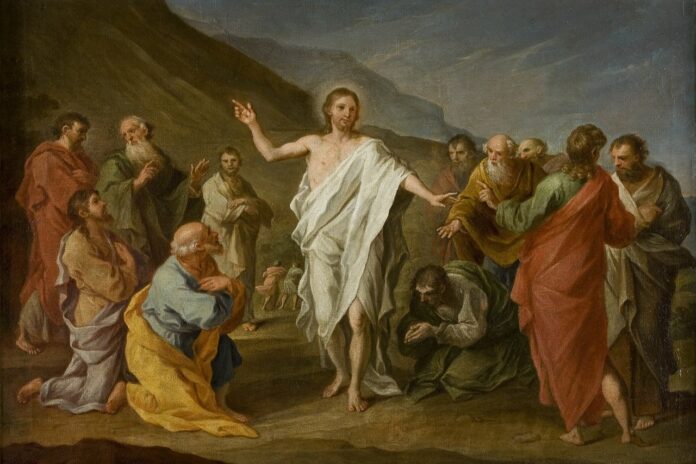
In response to Catholic Insight’s post of Carl Sundell’s list of 39 essential questions Catholics should be prepared to answer about our faith, I have been responding to them one-by-one to equip you with clear, concise and (hopefully) well-reasoned answers to help you grow and share your Faith.
None of these answers can be conclusive. They simplify answers and provide a framework to approach these questions. You can find links to previously published articles in this series at the bottom.
9. How does reason lead you to believe that, of all religions, Christianity is the true religion?
There are many paths by which reason can lead one to believe that, of all religions, Christianity is the true one. We will go straight to the heart of the matter, the truth which Saint Paul identified as the central fact of Christianity:
For I handed on to you as of first importance what I also received: that Christ died for our sins in accordance with the scriptures; that he was buried; that he was raised on the third day in accordance with the scriptures; that he appeared to Cephas, then to the Twelve. (1 Corinthians 15:3-5)
This claim, that Jesus literally, historically rose bodily from the dead, is technically an article of faith. Yet it is supported by historical fact, witnessed and shared by the Evangelists, the Twelve (including notably Thomas), and many others; and it is terms of facts and reason that we are discussing today.This is not to suggest that faith is unimportant in Christianity. Far from it: Luke 4:23-30, Matthew 14:22-33, Matthew 17:20, Luke 17:6! But it provides an opportunity to distinguish the difference within Catholic teaching between reason and faith. It also shows the built-in limits of reason and why the Christian, in order to be a Christian, must have faith.
The claim to the Resurrection is distinct in its verifiability. It either happened or it did not. It also vindicates Jesus’s unique claim to divinity. In a way, even though it is the result of Jesus being divine, from our perspective the Resurrection is the primary way by which we recognize that divinity. Finally, the Resurrection also acts as a useful bridge between the Christian religion’s reason-able claims and those that require faith.
Here is what I mean: as I said, the claim that Jesus rose from the dead is a claim that requires faith. However, the claims that Jesus of Nazareth existed, was born between approximately 6 BC and 3 AD, lived to approximately 30-33 AD, was sentenced to death by Pontius Pilate, was crucified around Passover, was buried in a tomb, and three days later that tomb was empty, and that his followers announced he rose from the dead, and that they were arrested and killed for doing so, are all verifiable historical claims (see footnotes in the next paragraph). Every single one of these claims can be verified by primary source, “non-Christian,” historical documents like any other historical claim from that period and most historical claims from any period.[1]
The point of listing these claims is twofold. First, it shows how much of Christianity welcomes and is built upon reason. The God of the “true religion” is not on top of a mountain one must climb, but humbly stoops down to our level to carry us up. While God is above our reason (Isaiah 55:8), he wants us to use our ”reason together” (Isaiah 1:18). Second, the list also shows us the limits of reason because believing all of those things above does not make one a Christian. The point of being able to verify that Jesus existed, was killed and his followers believed to their deaths that he rose will not prove that he did. However, it does prove that it is reasonable to believe it.
It is possible to believe that in light of all of these verifiable, historical claims something other than what Christians call the Resurrection of Jesus happened, but this would be just as much of a statement of faith. It does not become more reasonable to believe something non-miraculous when so much evidence (other than one’s assumptions about miracles being impossible) points toward a miracle.
Now, a second point in this question that requires parsing is the relationship between Christianity and “all [other] religions.” This too could be its own book, much less an article.
The Church has always recognized that “God has revealed himself fully by sending his own Son” (Catechism of the Catholic Church, 73). This idea is alluded to in John 1:1, 14 when “the Word” is identified as God and then “made flesh” in Jesus, and Hebrews 1:1-2 when the author contests how God first revealed through prophets then “last” through “his Son.”
This is a small sampling to illustrate the fullness of Revelation as opposed to only Revelation. There is also the often-used passage from Romans 2:14-15 about the knowledge of God’s law on the hearts of the Gentiles. While this is a very limited knowledge, it shows an important principle that some knowledge of God, even God’s will for how to live, to some degree, is possible outside of the fullness of Revelation present in the Church.
This principle allows for Christians to recognize in non-Christian religions some elements of truth. These are places where reason can recognize true things about God, sin, sacrifice, morality, virtue and worship. They all fall under the category St. Thomas Aquinas would call the “virtue” of religion (ST II-II. Q 81. A 2). He distinguishes it as a human virtue from a gift from God because it flows from our human nature. The fact that God has given grace by revealing himself through the Scriptures, then Christ and his Church, does not undermine that nature. Grace builds upon it.
On a final note that acts somewhat as a disclaimer: this, like many of these 39 questions, cannot be adequately covered in one response and may lead one to further, related questions. Some of these will be addressed in the following articles as part 10 questions the reliability of the Bible in general, 11 covers miracles of Jesus, 12 the reliability of the Apostles, and 13 covers the founding of the Church. All of the answers to these questions can be supported by reasonable claims, but the reason that supports these claims is meant to lead us toward deeper, stronger faith, a faith that reason can never replace.
Want to catch up on the previous questions? You can find parts one, two, three, four, five, six, seven and eight here!
_____________
[1] Existed, Crucified; Tacitus, Annals, Book XV, ch 44
– Existed, crucified under Pilate; Josephus, Antiquities of the Jews, Book XVIII, ch 3; book XX
– Empty tomb; while these are technically Christian sources, they are responding to non-Christian explanations for the empty tomb other than the Resurrection, which not only implies Christians were preaching the Resurrection itself, but also that they used the empty tomb as “evidence” for it; Matthew 28:11-15; Justin Martyr, Dialogue with Trypho, 180
– Christians worshipped Jesus; Pliny the Younger
– Christian’s believed Jesus rose; Celsus (quotes by Origen), The True Doctrine










